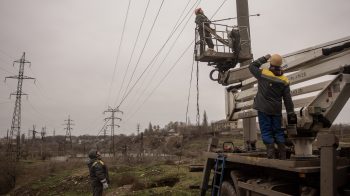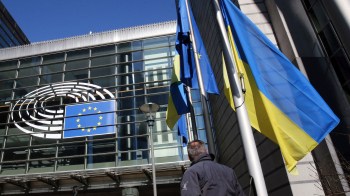
In a time of war, “sustainability of the government is No. 1,” says former Ukraine finance minister
In a time of war, “sustainability of the government is No. 1,” says former Ukraine finance minister

While Kyiv remains in Ukrainian hands, Russian attacks continue to take a heavy toll on the Ukrainian people and the nation’s economy. But how do you quantify that cost and what it would take to recover?
Natalie Jaresko was Ukraine’s minister of finance from 2014 to 2016, taking office shortly after the Euromaidan Revolution and Russia’s invasion of Crimea. During her tenure, she helped rebuild the Ukrainian economy and establish foreign lines of credit. Currently, the U.S.-born Jaresko is outgoing executive director of the Financial Oversight and Management Board for Puerto Rico.
“Marketplace” host Kai Ryssdal spoke with Jaresko about the state of the Ukrainian economy and the road to reconstruction. The following is an edited transcript of the interview.
Kai Ryssdal: Give me a sense, would you, from the people that I’m sure you’re talking to on the ground in Ukraine, aside from the human tragedy, what, if anything, can you shed light on with the Ukrainian economy?
Natalie Jaresko: Sure. The Ukrainian economy is being strangled right now. Ukraine’s economy is made up of a large export segment, and all the ports are blocked and/or destroyed. Several of the large steel facilities, which are a primary export, have been destroyed. And we’re heading into planting season. Ukraine is a major agricultural force in the world. Right now, the challenge for Ukraine is how much physical space, geography, is capable of being planted, and then how much do farmers choose to plant versus defend their territory? And then, you know, lastly, what supplies do they have in terms of diesel and petrol, which is typically imported from Russia and Belarus? Two major export sectors both in very, very difficult straits.
Ryssdal: Is it fair to say that the Ukrainian economy — specifically those sectors, but also things like dairy and consumer goods — it’s been converted to a wartime economy, right?
Jaresko: It is a wartime economy, but I actually did take a look this morning with some friends through some grocery stores in the Kyiv area, in the suburbs of Kyiv. And there is food, there are milk products, there are meat products, butter. The president, the government have been really pressing for the territory that’s not completely bombarded to please continue manufacturing. Food processing is key. In cities like Mariupol or Kharkiv, there’s nothing functioning.
Ryssdal: Here’s the thing, though, even in areas of that country where life is “normal,” it can’t be that people are going to work and going on about their business as usual. I mean, I can’t conceive of that.
Jaresko: You’re absolutely right. As I said, it’s a real effort to get people in more peaceful parts of the country, to the extent that they’re peaceful, to work. And so the government’s created a new line of credit at a very low interest rate for small- and medium-sized businesses to keep going. So there is a real attempt to get people to keep working if they can. But you’re absolutely right, most people are focused on defense.
Ryssdal: Part of the work you did when you were minister of finance in 2014 to 2016 was to set Ukraine up with foreign lines of credit after the Crimean invasion and after the prior presidency. And I guess the question is, how much of that money is left, do you suppose? And how far can it go?
Jaresko: Well, since then, and especially in the last month, Ukraine has attracted a great deal more financial support. The World Bank, the International Monetary Fund, the European Bank for Reconstruction Development, the United States government and others are providing what I’ll call macro support, both to cover the budget deficit of the government, because of course, tax revenues are not coming in, but also the incremental expenditures. You can imagine you have to pay unemployment to a larger number of people because they’re not working. And, you know, sustainability of the government is No. 1 right now, at a time of war. So it’s hard to make any estimate of what the deficit is, what the balance of payments gap would be, but I can tell you that the support continues.
Ryssdal: There will come a time where reconstruction and rebuilding is the conversation, not national defense and a wartime economy. What does that look like, do you suppose?
Jaresko: I spent my weekend trying to figure that out. I think the value of the capital stock in Ukraine is $7 trillion. So if you think about even just 10% of it being destroyed, let alone more — and right now, it looks like much more — you’re talking about hundreds of billions of dollars for reconstruction. And, you know, the first source of that should be reparations from Russia. They should have to pay for the damage that they’ve caused. A second, the international financial community will need to be supportive, whether it’s the International Monetary Fund, the World Bank and other bilateral parties, and then the private sector. You know, I’m in Puerto Rico right now, and I was here in the post-Hurricane Maria period. And, you know, Puerto Rico’s 1/66 the [geographic] size of Ukraine, and the cost of the post-Hurricane Maria rebuilding of this island was estimated at about $80 billion. So what does that tell you about the amount of money that’s going to be necessary to rebuild Ukraine?
There’s a lot happening in the world. Through it all, Marketplace is here for you.
You rely on Marketplace to break down the world’s events and tell you how it affects you in a fact-based, approachable way. We rely on your financial support to keep making that possible.
Your donation today powers the independent journalism that you rely on. For just $5/month, you can help sustain Marketplace so we can keep reporting on the things that matter to you.

















